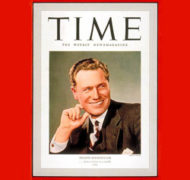The Challenge of Empathy
Blog / Produced by The High Calling
One of my vivid memories of youth is shaking hands with Nelson Rockefeller. The governor’s campaign trail wound through Buffalo, and greeting “Rocky” was a crowd of several hundred, myself included. I stepped forward and shook his hand. For a teenager, it was quite a thrill.
The only governor I ever knew growing up was Gov. Rockefeller. From the time I was in kindergarten throughout my school years, “Rocky” was governor of New York. He implemented several beneficial programs during his tenure as governor. They were beneficial... and costly. Taxes rose, and citizens as well as businesses felt the effects. By the time I left for college, people and businesses were leaving New York State.
Rockefeller was simply out of touch with the people that he led. Consider this quote from the United States Senate website:
Although he campaigned as a man of the people, he lived in a different world. When aides proposed a plan for the state to take over state employee contributions to Social Security in order to increase their take-home pay, Rockefeller asked, "What is take-home pay?" (1)
Empathy makes a leader noble and admirable to the people being led. Sacrifice and solidarity for the greater good are easier for people when their leader shows empathy for their struggles. Followers need someone they can identify with, but more importantly someone who understands their pain.
Even in our own places of work, we know the importance of an empathetic leader. Someone who doesn’t understand the possibility of pain caused by a leadership decision is not an effective leader in difficult times.
In his recent book, The Social Animal, David Brooks describes empathy as a building block of morality: “Many scientists believe that the ability to unconsciously share another's pain is a building block of empathy, and through that emotion, morality.”
Psychiatrist Nassir Ghaemi has an interesting take on empathy. In his book, A First-Rate Madness: Uncovering the Links Between Leadership and Mental Illness, he writes, “Depression makes leaders more realistic and empathic, and mania makes them more creative and resilient.” Later in the book he states:
All of this research adds up to one conclusion: empathy is not a vague concept; it is a neurobiological fact. We are wired, literally, to feel the movements, emotions, and pain of others. So we should take empathy seriously, including the psychological effects.
There’s a reason we’re wired for empathy. We can't understand each other through words alone; we need to touch, to feel, to stroke each other emotionally and even physically. It is generally estimated that at least one-half of human communication is nonverbal. . . .Without empathy, we can barely communicate with each other. (2)
There is also a danger in over-empathizing. It can cause a leader to freeze when the pain for the follower is too great for the leader to make necessary and beneficial decisions for the common good.
Effective leadership, that which is helpful and long-lasting, requires a certain amount of empathy. Being “of the people” and a “champion of the common good” requires a deep understanding of how people feel at a very deep level.
The best example of that type of leadership emerged during the height of the Roman Empire. Up to that point, political leaders had appeased the people to keep uprisings down. The quest for power and growth of property were the standards of the time. As a result, people were suffering and confused. There was little hope, and people were confronted with a cacophony of voices representing varied religions and superstitions all vying for control or offering hope.
Into that world Jesus was born. An empathetic leader who suffered, died, and was buried. In his death, he was fully human and lost his identity as he was separated from the love of God. According to the Apostle's Creed, “He descended into hell.” But he rose from the dead, and his kingdom reigns.
That is the good news. Told over and over again in the New Testament, it serves as the fulfillment of the Hebrew Scriptures. The good news of Christ offers freedom and hope, and the standard of leadership for all of us.
Dan Roloff has worked for the H. E. Butt Foundation since the early 1980s in a variety of positions. He continues to be a source of wisdom for us as we reflect on what we have believed since our inception as a Foundation in the 1930s.
(1) United States Senate website.
(2) Nassir Ghaemi , A First-Rate Madness: Uncovering the Links Between Leadership and Mental Illness, Chapter 6.
Image of Nelson Rockefeller on TIME Magazine, May 22, 1939, available in the public domain.





